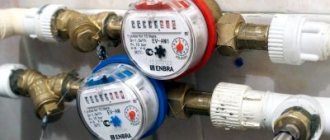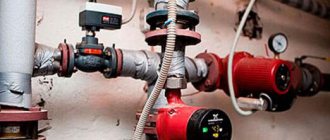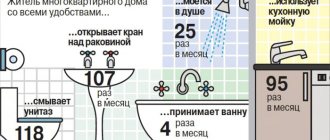For what period is it possible to turn off hot water?
According to the requirements of [1] SanPiN 2.1.4.2496-09, the supply of hot water must be uninterrupted. However, the following caveats exist to deal with unusual cases:
- To eliminate an emergency situation no more than 8 hours per month. In this case, the daily limit is no more than 4 hours. In case of an accident, a dead-end highway can be repaired within 24 hours straight. There are types of work that are capital in nature and, due to their complexity, cannot be completed within the prescribed time frame. But this is rather an aggravating circumstance for utility workers. And an increase in the period for eliminating the accident serves as a reason for recalculation.
- To carry out mandatory preventive measures, which are carried out only in the summer, the permissible duration of work is limited to 14 days. If the lack of hot water in the fall, or worse, in the winter, is caused by preventive work, then this is not true information. Since this type of work is carried out with the approval of local authorities only in the summer. Despite the inconvenience caused, prevention of the hot water system is very important. The further service life of the system and its quality parameters, such as network pressure and temperature, depend on the quality of work performed.
The time of the listed shutdown is fixed by law [2] by Resolution No. 354 of the Government of the Russian Federation. That is, turning off the hot water system for a period longer than is regulated by law is an unlawful action on the part of the utility company. You can resolve the situation by contacting the territorial office of Rospotrebnadzor.
Situation one – frequent power outages
Power outages in autonomous living conditions can not only cause a sharp decrease in the comfort of suburban housing, but also provoke the failure of various engineering equipment. It is especially dangerous when a power outage occurs while the pump motors are running. This applies to deep artesian pumps, pumps installed in the coolant circulation system, and hydrophores.
To avoid such problems, you can go in two ways. One involves the installation of emergency gasoline or diesel generators, and the second involves connecting all vital equipment to specialized uninterruptible power supplies. Both options are possible. Emergency UPSs (inverters that convert battery energy into alternating voltage) are best used online, just as computers are constantly connected to uninterruptible power supplies, which instantly switch to the battery when the mains voltage disappears. The advantage of such a connection is that in the event of a sudden shutdown of the supply voltage while the engine is operating or starting, it will continue to operate and the equipment driven by it will continue to operate, and the engine itself will not be harmed. And then you can safely start the emergency generator.
The disadvantage of organizing emergency power supply for asynchronous motors from inverter-type sources is the high starting current. To prevent significant current surges when starting motors, for example, a pumping station, it is necessary to install soft starters on each asynchronous motor with a power of more than 500 W. Otherwise, surge current may damage the inverter converter.
As for the generator, it makes sense to purchase such an installation so that its power covers the total power of all vital consumers, taking into account the power reserve required to start electrical equipment. Otherwise, the generator may simply stall upon startup.
In some cases, it may be useful to purchase generator sets with automatic transfer. That is, the generator will start on its own and automatically transfer all equipment to a backup power supply circuit after a certain time after the mains voltage disappears. However, for such systems to operate correctly, it is necessary to keep the generator warm. As practice shows, in conditions of negative temperatures, autostart systems often do not work properly.
Actions of utility services in case of water outage
Any actions carried out by employees of all public utilities are worked out by the “Rules for the Provision of Public Utilities,” which clearly defines the algorithm of work.
In a situation where hot water is turned off, regardless of the reason for this situation, the first step for workers is to notify the residents of the house, indicating the reason and the approximate date for its elimination. A tenant who is not notified has the right to appeal the actions of public utilities.
Actions aimed at promptly eliminating the accident or eliminating the consequences of a disaster do not require notification. This range includes disconnections of unauthorized taps into the system and residential disconnections for debtors and careless residents who threaten their neighbors with flooding.
If the hot water supply is still cut off, then based on [3]Chapter VIII of Resolution No. 354 of the Government of the Russian Federation, the payment must be recalculated in the following cases:
- in case of exceeding the permissible temporary duration of DHW shutdown, payment for utility services is reduced in the amount of 0.15% of the payment amount for each overdue hour. It is important to understand that recalculation is performed only under the item “Hot water supply” and in the absence of a water meter in the apartment;
- If hot water is turned off during the summer, the payment will be withdrawn in full. The main thing for meter owners to remember is that the hot water tap can supply water intended for hot water, but not heated to the standard temperature. The readings will be read and, as a result, you will be forced to pay for the consumed cubes of cold water at the price of hot water. It is the responsibility of the management company to close the valves on the supply line, but in order to avoid an unpleasant situation, it is better to close the apartment valve on the DHW riser.
Situation two – failure of a deep-well pump or pumping station
The most important unit, which is entrusted with the main task of extracting water from a well or well, is a deep pump or water station. Despite the very high reliability of such devices, due to a number of objective reasons they can also fail.
Replacing pumps may take some time. As a rule, you should focus on a period of time of no less than a day. Based on the daily water consumption for the home, it is advisable to install a reserve tank. As a rule, for most cases a capacity of 200 liters to a cubic meter is sufficient. It is best to choose a container made of plastic or stainless steel. Particular attention should be paid to choosing the location for its installation. A warm attic at home or a warm caisson for equipment at a well can be considered optimal. The advantage of installing a container in a warm attic will be the possibility of water flowing by gravity in case of problems with starting the generator when the network is turned off. The advantage of installing a backup water supply tank in a caisson will be the ability to fully provide water to all consumers who need a certain water pressure.
The backup water supply tank can be installed either in a common pipeline or separately. The advantage of installing it in a common pipeline is the constant renewal of water in the tank. However, for the normal operation of such a system, it is necessary to separate the deep pump and hydrophore. You also need to equip the container with sensors for upper and lower water levels. In this case, there will be no pressure in the reserve tank. The deep pump will turn on when the water level drops to the minimum level and will pump water into the container until the upper level sensor is triggered. A hydrophore connected to it from below through a check valve separates the water from the container and supplies it to the water supply network of the house.
The disadvantage of the through-flow tank is that there is a fairly high probability that there will be little water in it at the time of pump failure. In this case, it is preferable to install a container in the form of a hydraulic accumulator or a large-volume boiler. These containers work under pressure and will always have water in them. Moreover, if you choose a hydraulic accumulator of significant volume, then you can receive water under pressure for quite a long time, regardless of where the accumulator is installed, if there are no leaks in the system. You can take water from the boiler if you make an insert between the check valve and the cold water supply pipe. You need to cut in a tee and install a ball valve in the side outlet of it. Now, if you need to disassemble water from the boiler, but there is no pressure in the line, just open this valve and any hot water tap connected to this boiler. Air will begin to flow into the boiler through the hot water valve, and water can be disassembled from the drain tap. The heating circuit of the boiler, regardless of the type of heating, must be turned off. The boiler can only be turned on after it has been filled with water and the causes of the accident have been eliminated.
There are often two water sources on a site. Old well and artesian well. Having felt how much more convenient it is to use a well in everyday life, some country property owners are beginning to be tempted to fill up the well. This is not worth doing. On the contrary, it needs to be put in order, a container with a volume of at least 5 cubic meters must be purchased, which must be installed on a stand and pumped with water from a well from spring to autumn. This water can be used for watering plants, as well as for technical needs in case of emergency, and if you monitor the constant circulation of water in the container, you can use it as drinking water after boiling.
Actions of residents in the absence of hot water supply
If you discover a lack of hot water, you must immediately contact the manager of the management company and find out the reason and the approximate time frame for troubleshooting. If the time goes beyond the time frame allowed by the rules, then your claims must be recorded with the utility company.
You can do this by phone, asking the dispatcher for the registration number of your request and the name of the person in charge. Or in writing with a mark on your copy indicating receipt of the incoming application.
Upon your request, a competent commission is created that verifies the facts stated in the application and records them in the act. One copy of the act with the signatures of the commission members and the applicant remains with the employee of the utility organization, and the second is provided to the resident. If the tenant does not agree with the conclusions of the commission, he has the right to write a special opinion on all copies of this act.
Disconnections of hot water are a violation of the rights of residents of the house as consumers. Also, frequent stops lead to a decrease in water quality. Infringing on the rights of those living in the house is punishable for responsible persons; you just need to know your rights and promptly remind negligent specialists of their existence.
Reasons that can cause restrictions on water supply
The supply of cold and hot water to the consumer is carried out by the resource supply organization. It has the right to temporarily stop or limit water supply.
Suspension of services occurs in the following cases:
- the occurrence of an accident, liquidation of its consequences;
- a sharp decline in the quality of drinking water;
- the need to supply large volumes of water to the fire site;
- entry of unacceptable substances into the water supply;
- execution of court orders;
- receiving instructions from the sanitary-epidemiological station;
- emergency condition of the consumer’s internal water supply networks;
- connecting new consumers;
- unauthorized connection of the consumer to water supply systems;
- carrying out scheduled maintenance work in water supply systems;
- consumer debt to pay.
Within the framework of the agreement between the supplier and the consumer, the same measures are applied if it is recorded that the controllers of the resource supplying organization are not admitted to the installation site of metering units for the purpose of inspection, control, and taking readings.
Cold water limitation
Article 21 of the Federal Law “On Water Supply and Sanitation” contains the requirement that the supplier does not have the right to limit the supply of cold water supply in apartment buildings, except for the first six points of the above list.
This is done in order to prevent even more severe consequences that could occur if a large number of people in one place are left without water.
Most apartment buildings do not have the technical capabilities to cut off the supply to one individual apartment. And closing the general access valve will lead to punishment for those who regularly pay.
DHW limitation
The supplier can restrict hot water supply at any point . He is responsible for preparing (heating) water to the required level and delivering hot water to the consumer.
Heating of water to the set temperature is carried out by the supplier or subcontractor. The supplier is also responsible for minimizing heat loss during water delivery. Monitoring the compliance of the total apartment consumption with the general household consumption is the task of the supplier.
Where does the hot water come from in the tap?
To understand why hot water is turned off in Russia every summer, you need to understand how the water in the tap is made hot in the first place. There are two main schemes. The first is closed, when cold drinking water is heated using hot water from the heating network (this is the same water that goes through pipes and heats, for example, radiators in the house). This can happen at the Central Heating Station for several houses or in the basement of one house. These two waters do not mix, and clean hot water flows from the tap in the apartment. Drinking it is still highly not recommended.
water
Photo: IZVESTIA/Alexander Kazakov
The second scheme is open, when water from the heating network immediately goes to the apartment. Then water that will most likely flow out of the tap will have a color and odor. These are chemical residues that are passed through pipes to prevent scale formation. You can't drink this either.
They rolled out the pipe: why are Russians being charged extra payments for housing and communal services?
Homeowners have to pay for excess heat and fraud by management companies









